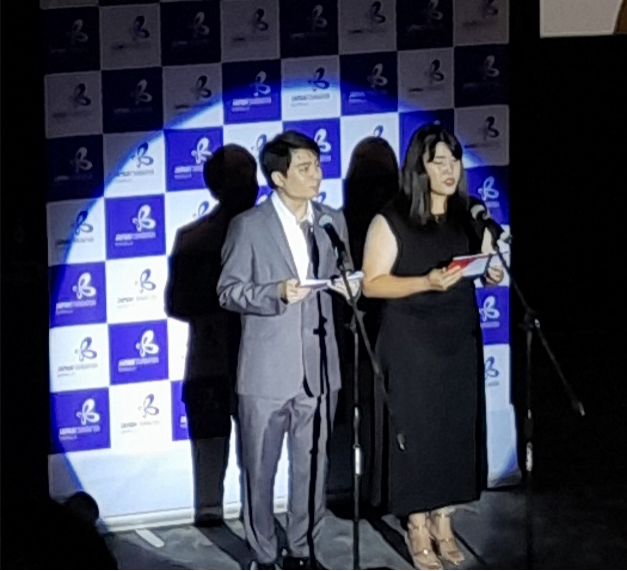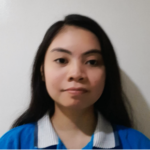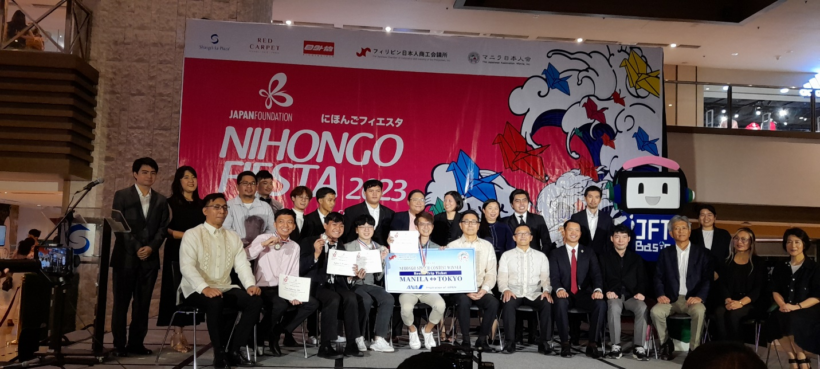by Elijah Jasmin J. Velasco
The Nihongo Fiesta 2023 was held at Red Plaza Cinema 2, in the Shangri-la Plaza Mall, Manila, on February 25, 2023. People from various parts of the globe attended the event, including some international officials and local dignitaries like the district representative of Camarines Sur, Mr. Tsuyoshi Anthony Horibata, and Mr. Takano Seiji, the president of the Japanese Association.
The Japan Foundation is a Japanese organization that is committed to carrying out extensive international cultural exchange programs across several continents. Their many programs and information services aim to provide chances for individuals from Japan and other nations to connect with one another, with the end goal of fostering a deeper mutual understanding between the people of Japan and those in other countries and regions.
Nihongo Fiesta is one of these many programs conducted by the Japan Foundation in honor of all those who are studying Japanese. This celebration is a meeting place for members of the Nihongojin1 community to get to know one another and enjoy displays of the Japanese language, art, and cultural acts.

Masters of Ceremonies, Mr. Kristofer Katsumata, and Ms. Claire Ferolino.

The Ambassador of Japan in the Philippines, H.E. Koshikawa Kazuhiko delivering his opening remarks for the Nihongo Fiesta 2023.
The event began with an opening address and pleasantries delivered by Koshikawa Kazuhiko, the Ambassador of Japan in the Philippines. This was then followed by a speech given by the Communications Officer of the Philippine DFA, Mr. Richard Z. Roldan, in which he expressed his profound gratitude to Japan and spoke about his visits to the many areas of the aforementioned nation, as well as his admiration for the culture of the Nihonjin people.
Before the main highlights of the Fiesta, many invited guest speakers, the majority of whom were Japanese language instructors, joined the stage to share their experiences on how they became proficient in the language and what inspired them to study it…their words not just instilling inspiration but also serving as a springboard for Nihongojin students of the future.
The winning videos from the fourth annual Nihongojin International Video Competition (Nivicon) were showcased. The three categories of the NIVICON are, respectively, My Precious Person / My Friends, My Treasures, and lastly, My Neighborhood. Students ranging from eighth to twelfth grades from different schools across the country took part in the competition, demonstrating their comprehension of the Japanese language as well as their perspectives on the various categories. These students demonstrate the importance and meaning of “Tomodachi2,” as well as their understanding of “value” and love for their community. But there was one that drew my attention, and it was the first-place winner of the second category who spoke about her artworks as her treasure. Indeed, passion is a treasure that we can’t recreate after we’ve given up on it.

Special Performance of Taiko Beat by Leonard Eto and Tusa Montes, smiling and appreciating each other’s music.
The 50th annual Nihongo Speech Contest featured competitors from nine different universities, all of whom were vying for the grand prize of an all-expenses-paid weeklong study tour in Japan. Each one of the competitors left a lasting impression on the panel of judges, either through their comedic or meaningful delivery of their speeches.
After a brief break was a stunning stage performance by Leonard Eto in collaboration with Tusa Montes performing a taiko beat along with local instruments that mesmerized the crowd. This year’s winner of the Nihongo Speech Contest is a student from the University of the Philippines, Dennis C. Roxas. His winning speech, which was delivered in Japanese and titled “Kind Words Will Change the World,” was really deserving of the crown since he underscored how Japanese is a language of kindness.

The winner of the 50th annual Nihongo Speech Contest, Mr. Roxas, while delivering his speech on the transformative power of empathy and words.
Since the event has been held online over the course of the past years, it is possible to say that this year’s Nihongojin is the grand comeback of the Nihongo Fiesta program since the pandemic began. Not only have they marked the reopening of their program with the hosting of this event, but in addition, they have reignited the enthusiasm that had waned among the students of the Japanese language.
“Start speaking in the first place, even if you don’t speak it fluently or sound unnatural, the mistakes that you make during this process make you grow as a language learner.” – Melvin A. Prado, Mindanao Kokasu Daigaku.
Japan is known to have one of the most beautiful language and traditional arts, the opportunity to witness them being performed live with hundreds of people who appreciates this culture the same way is an honor and a privilege that I would like to share. I can think of no better way to become acquainted with Japan than to study its official language, Nihongo. When you study a foreign language, you gain insight and familiarity with the culture of the people who speak that language, and this program demonstrates the importance of intercultural exchange, not only for the growth of the nation but also, for the individual students who participate in them through the broadened perspectives they gain.
I’d like to express my gratitude towards the sponsors and volunteers that made this possible. It is my fervent wish that initiatives like this will continue for future generations to come.
自分の言語の限界が、自分の世界の限界。
The limits of my language are the limits of my world.– Ludwig Wittgenstein (1922)
Nihongojin1 – coined from NIHONGO (Japanese language) and JIN (person). This refers to native/non-native individuals involved in Japanese Language Education.
Tomodachi2 – This means friends or companions in Japanese.
Reference:
The Japan Foundation – About the Japan Foundation. (n.d.). https://www.jpf.go.jp/e/about/outline/about_01.html
About the author:

Elijah Jasmin Velasco is a BSED EN student in her third year at the Polytechnic University of the Philippines, San Juan. She is a Global Youth Community delegate with novice proficiency in Nihongo and a deep interest in Japanese culture. She loves reading novels as a hobby and her favorite quote is “The story changed every time I read it. The story was over, but it wasn’t over. The story wouldn’t end unless the reader gave up on the story.”










